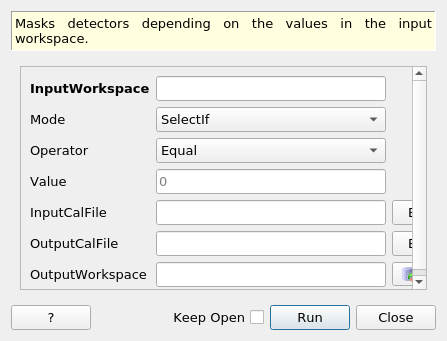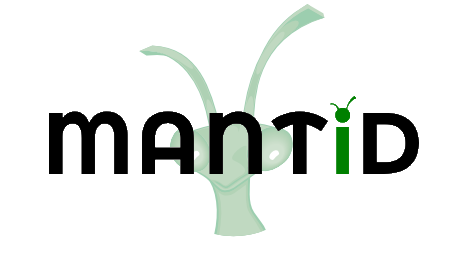\(\renewcommand\AA{\unicode{x212B}}\)
MaskDetectorsIf v1¶

MaskDetectorsIf dialog.¶
Summary¶
Masks detectors depending on the values in the input workspace.
See Also¶
Properties¶
Name |
Direction |
Type |
Default |
Description |
|---|---|---|---|---|
InputWorkspace |
Input |
Mandatory |
A 1D Workspace that contains values to select against |
|
Mode |
Input |
string |
SelectIf |
Mode to select or deselect detectors based on comparison with values. Allowed values: [‘SelectIf’, ‘DeselectIf’] |
Operator |
Input |
string |
Equal |
Operator to compare to given values. Allowed values: [‘Equal’, ‘NotEqual’, ‘Greater’, ‘GreaterEqual’, ‘Less’, ‘LessEqual’, ‘NotFinite’] |
Value |
Input |
number |
0 |
|
InputCalFile |
Input |
string |
The name of the CalFile with grouping data. Allowed extensions: [‘.cal’] |
|
OutputCalFile |
Input |
string |
The name of the CalFile with grouping data. Allowed extensions: [‘.cal’] |
|
OutputWorkspace |
Output |
The masked workspace. |
Description¶
Iterates over the input workspace evaluating the test for each bin in each spectrum, and will select (or deselect) it is any of the bins match the test. There are two output modes:
- Output to a calfile
For this mode the properties
InputCalFileandOutputCalFilehave to be set. If the detectors should be masked it deselects all of the contributing detectors in the output calfile. All other aspects of theInputCalFileare copied over to theOutputCalFile.- Output to a workspace
For this mode the
OutputWorkspaceproperty has to be set. The algorithm masks the selected detectors (Mode='SelectIf') or unmasks deselected ones (Mode='DeselectIf') for the output workspace. Masking will clear the data in the spectra under question. Unmasking will just clear the masking flag but will not restore the data.
Note
If you select the NotFinite operator, the value property is ignored. This operator finds values that are infinite or NaN.
Usage¶
Example - mask spectra whose integral is below some limit
ws = CreateSampleWorkspace()
# One spectrum has lower counts than the rest
badIndex = 3
Ys = ws.dataY(badIndex)
Ys *= 0.01
integral = Integration(ws)
MaskDetectorsIf(integral, Operator='Less', Value=10., OutputWorkspace=integral)
MaskDetectors(ws, MaskedWorkspace=integral)
# Inspect the result
isMasked = ws.spectrumInfo().isMasked(badIndex)
print('Spectrum at index {} is masked? {}'.format(badIndex, isMasked))
Output:
Spectrum at index 3 is masked? True
Categories: AlgorithmIndex | Diffraction\Masking | Transforms\Masking
Source¶
C++ header: MaskDetectorsIf.h
C++ source: MaskDetectorsIf.cpp
